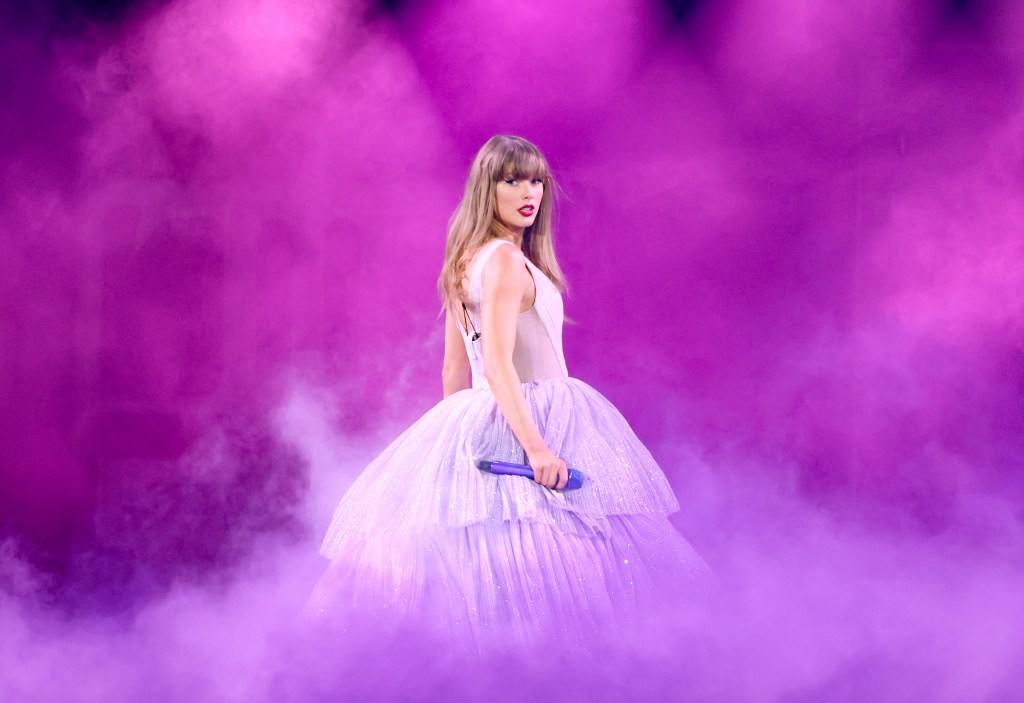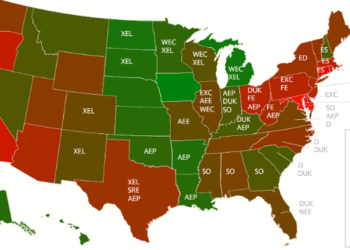
Camus once wrote of the cursed king of ancient Greek mythology, doomed to roll the same boulder up the same hill for all time, that “one must imagine Sisyphus happy.” For a long time, the same could be said about Taylor Swift. If you wanted to see her happy, you had to imagine it for yourself, because you certainly weren’t going to get it from her music. Not anymore. Taylor Swift 1, Sisyphus 0.
What does Taylor Swift happy sound like? For one thing, short. Swift’s new album, The Life of A Showgirl, clocks in at just over 41 minutes, or 12 songs. Especially after The Tortured Poets Department’s 30-song wallow in a cattle trough of blood and guts, The Life of a Showgirl feels tight and slight—a burst of fizzy orange candy on your tongue, a comet briefly streaking the sky.
Max Martin and Shellback (producers with whom Swift partnered for 1989 and Reputation) have reputations as hit factories and an approach to fun that ranges from productively disciplined to robotic. It pays off here; the new album opens with a one-two-three wallop. “The Life of Ophelia,” “Elizabeth Taylor,” and “Opalite” are bright, confident, soap-bubble melodies with a percussive intensity behind them: These are songs for driving to the beach with your sister, windows down; songs for dancing on the deck with your second Yuengling in hand. “Opalite” in particular reminds me of Abba, which is the highest compliment I can pay to a pop song.
The energy in these songs isn’t just a sonic quality. It comes from the sense Swift projects of being scarred, battle-hardened—but nevertheless, decisively all in. In “The Fate of Ophelia,” she is on the verge of swearing loyalty “to me, myself, and I” before love finds her. In “Opalite,” she is “dancing through the lightning strikes/sleepless through the onyx night” and reminds herself that everyone, including her, has seen this story play out before. She then asks Elizabeth Taylor, with the urgency of intercessory prayer to a patron saint, if it’s forever. She’s not 18 anymore, writing fantasies about Romeo and Juliet. But she is no less dedicated: “I pledge allegiance to your hands, your team, your vibes.” On Lover, Swift’s spun-sugar pop album haunted by a deep ambivalence about love, the tensions broke down into a pervasive anxiety—Lover’s title track is a wedding song that doesn’t end in a wedding. Here, they resolve into a kind of chin-up, gambler’s defiance.
Elizabeth Taylor was, like Taylor Swift, famous for her tempestuous relationships. Like Swift, she had a stubborn loyalty to her own past (it takes a certain type of personality to marry the same man twice); like Swift, she was an extremely savvy businesswoman. The perfume brand White Diamonds was pulling over $60 million in yearly sales at the time of her death—more than any of her films ever made her. She’s a natural choice for Swift’s ongoing project of meditation on her own fame through the lens of famous women before her: socialite Rebekah Harkness, actress Clara Bow, musician Stevie Nicks. She is also the only real-life showgirl—in the loose and evocative sense of a woman both illuminated and hardened by the public eye—invoked on the album. This disappoints me on a personal level: I wanted a song called Barbara Stanwyck.
But the relative absence of showgirls is also a problem with the album, which seems confused about what it is trying to be. In its title, aesthetics, and marketing,The Life of a Showgirl seems to promise a concept album that appears only in flashes. The title track, the very last on the album, is one of its best despite the absolute howler of “legitly” as a rhyme for “city.” But there’s little that connects the upbeat show business fable with the rest of the record.
This is not to say that The Life of a Showgirl has nothing on its mind besides good vibes. More than fame, success is the conceptual ball of yarn that The Life of a Showgirl worries and tugs. “Father Figure” (inspired, according to Swift, by Succession’s Logan Roy) sketches a kind of ruthless patriarchal heavyweight common to entertainment industries, law firms, criminal enterprises: anywhere that sharks feed. He pays the check. He drinks brown liquor. He makes deals with the devil. As the song progresses, the lyrics tell a straightforward story from the father figure’s perspective: an ungrateful protege, kindness mistaken for weakness, and a coup thwarted. But I didn’t realize this until I read the lyrics closely, because in the listening experience, a key change after the bridge solidifies a subtle sense of switched perspective—as if the song is now telling the story of the exploited protege, finally able to turn the tables. “You made a deal with this devil/turns out my d–k’s bigger.” For a long time, old man, you’ve been confused about who has the muscle in this relationship. Swift effectively tells two stories from opposing perspectives at the same time, a device that mirrors her position. She is both a once-ingenue who staged a revolt against her handlers, and she is now, unequivocally, for better and for worse, the godfather. In the Lover portion of Swift’s Eras Tour, Swift wore a giant pinstripe blazer to make some tedious point about how if she were a man, things would be different. Now, if she’s wearing a giant pinstriped blazer, it’s because she has a business meeting with her consigliere, and someone’s going to sleep with the fishes.
“Actually Romantic” is also written from a position of consolidated strength. Swift’s previous conflict songs (“diss tracks” seems too specific a genre to describe a theme Swift has returned to, at higher and lower levels of personally directed animus, over and over) often tried to convince you that she’s right and damages are owed. This one is simpler, essentially just calling fellow popstar Charlie XCX (whose alleged trash talking to mutual acquaintances seems to have annoyed Swift more than XCX’s semi-diss song “Sympathy is a Knife”) a yappy little chihuahua. It doesn’t rise to the bratty, acidulated heights of “Mean” or “Better than Revenge,” but it does benefit from its posture of open dominance.
Still, overall, the second half of the album never measures up to the energy of the first, resulting in a whole that never transcends the sum of its parts. “Cancelled!” is fun and silly. “Wood” is a sweet bop about being fixed by the love of a good man, told through a series of cheeky double entendres about the precise nature and dimensions of that love; entendres which, while relatively tame on the lewdness scale, are somehow even more agonizing to listen to in a public setting for that reason. “Honey” should have been better, but suffers, as critic B.D. McClay notes, from a frustrating dearth of Swift’s trademark narrative specificity.
The song bridging these two halves is “Ruin the Friendship,” a bittersweet ode to a high school friend who died young. Its soulful balladry seems to belong on a different album—a country album. (It’s a great song as-is, but the recently released acoustic version feels like a revelation) Swift hasn’t been back to her country roots in a while. Making a pop album that is just a damn good time is a fine goal. It makes sense for where she is—after the demands of the Eras Tour; after the messy, risky, much-maligned ambition of The Tortured Poets Department; during her masters-reclamation victory lap. But eventually, Swift is going to need to challenge herself, and she’s going to need more worlds to conquer. Country has come up in the world since Taylor fully left for pop with 1989. It offers new competitors and the space for experiments. And it has its own showgirl canon. Why not give Shania a ring?
















